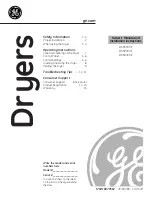
13
Dryer will not run
■
Check the following:
Is the power cord plugged in?
Has a fuse blown, or has circuit breaker tripped?
Was a regular fuse used? Use a time-delay fuse.
Is the dryer door firmly closed?
Was the START pad firmly pressed?
Is a cycle selected?
Unusual sounds
■
Has the dryer had a period of non-use?
If the dryer hasn’t been used for a while, there may be a
thumping sound during the first few minutes of operation.
■
Is it a gas dryer?
The gas valve clicking is a normal operating sound.
Lint on load
■
Is the lint screen clogged?
Clean lint screen. Check for air movement.
■
Is the load properly sorted?
Sort lint givers (towels, chenille) from lint takers (corduroy,
synthetics). Also sort by color.
■
Is the load too big or too heavy?
Dry smaller loads so lint can be carried to the lint screen.
■
Was the load overdried?
Use correct dryer settings for load type. (See “Drying, Cycle
and Temperature Tips”.) Overdrying can cause lint-attracting
static electricity.
■
Was paper or tissue left in pockets?
Clean out pockets before drying.
■
Is pilling being mistaken for lint?
Pilling (surface fuzz) is caused by normal wear and
laundering.
Stains on load or color change
■
Was dryer fabric softener properly used?
Add dryer fabric softener sheets at the beginning of the cycle.
Fabric softener sheets added to a partially-dried load can
stain garments.
■
Were items soiled when placed in the dryer?
Items should be clean before being dried.
■
Were items properly sorted?
Sort light colors from dark colors. Sort colorfast items from
noncolorfast items.
Items shrinking
■
Was the dryer overloaded?
Dry smaller loads that can tumble freely.
■
Did the load overdry?
Check the manufacturer’s care label. Match dryer setting to
load type (See “Drying, Cycle and Temperature Tips”).
Loads are wrinkled
■
Was load removed from dryer at the end of the cycle?
Remove load as soon as tumbling stops.
■
Was the dryer overloaded?
Dry smaller loads that can tumble freely.
■
Did the load overdry?
Check the manufacturer’s care label. Match dryer setting to
load type.
(see “Drying, Cycle and Temperature Tips”).
Odors
■
If the dryer is electric, is it being used for the first time?
The new electric heating element may have an odor. The odor
will be gone after the first cycle.
■
If the dryer is gas, there may be a gas leak:
Turn off the gas supply line, leave your house and then call
your local gas company.
■
Have you recently been painting, staining or varnishing in
the area where your dryer is located?
If so, ventilate the area. When the odors or fumes are gone
from the area, re-wash the clothing and then dry it.
Garment damage
■
Check the following:
Were zippers, snaps, and hooks left open?
Were strings and sashes tied to prevent tangling?
Were care label instructions followed?
Were items damaged before drying?

































